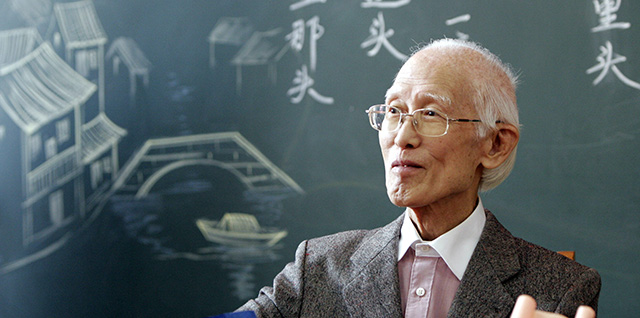
Chinese poet Yu Guangzhong passed away on Dec 14. CFP
在中国诗人余光中的诗歌《乡愁》中,他形容自己对已故母亲的思念是一座坟墓,令两人天人永隔:
“Nostalgia was a low grave/ Me on the outside/ Mother on the inside.
“乡愁是一方矮矮的坟墓,我在外头,母亲在里头。”
And when the news came that Yu passed away on Dec 14, this metaphor was quoted and rewritten by his fans to express their nostalgia for this great writer:
当余老于12月14日逝世的消息传出后,这个比喻被粉丝们加以引用并改写,来表达他们对这位伟大作家的缅怀之情。
“Now it’s us on the outside, and you on the inside.”
“如今我们在外头,而你却在去了里头。”
Born in 1928 in Nanjing, Jiangsu, Yu spent his younger days on the Chinese mainland before moving to Taiwan in his 20s. Nostalgia – which Yu wrote in his 40s to voice his homesickness for his childhood motherland – became his most well-known work, since it resonated with many who were far away from home. The poem appeared in Chinese school textbooks and was adapted into songs.
余光中1928年生于江苏南京,在中国大陆度过了自己的少年时代,20多岁时迁往台湾。余光中写乡愁时已过不惑之年,他抒发了自己对于童年故土的思念之情,这首诗在许多背井离乡的人中引发共鸣,因而成为了他最负盛名的作品。该诗曾被选入中国大陆的语文课本,并被改编成多首歌曲。
However, the fact that Nostalgia became so famous also disturbed Yu because among the over 1,000 poems that he’d written, Nostalgia seemed to be the only one that the public ever talked about and appreciated.
然而,《乡愁》的名气也给余光中带来了困扰,因为在他所作的1000多首诗歌中,似乎从来只有《乡愁》被公众所谈论和欣赏。
“I’d like to think of Nostalgia as my business card, but unfortunately it got too big that it kept people from seeing the real me,” Yu once said, according to China Youth Daily.
据《中国青年报》报道,余光中曾说,“《乡愁》是我的名片,但也好像一张巨大的名片,有时遮住了我本人的面孔”。
Indeed, writing poems is only one of Yu’s many talents. Great Chinese writer Liang Shiqiu (1903-1987) once said of Yu, “He writes poems with his right hand and proses with his left. There is hardly anyone who matches his achievements at the time.”
诚然,写诗只是余光中众多才华之一。中国文学大家梁实秋曾这样评价余光中:“右手写诗,左手写散文,成就之高一时无两。”
Yu was also a translator. According to CGTN, Yu spoke French, German, Spanish, Italian and Russian, and published 13 translation collections.
余光中同时也是位翻译家。据中国国际电视台报道,余光中通晓法语、德语、西班牙语、意大利语以及俄语,并出版了13部翻译作品集。
And he used his talents well. He spent his whole life working, even in his 80s. According to Xinhua News Agency, Yu said in October that whenever people asked whether he still kept the habit of writing up, he would always answer, “Why don’t you ask me if I’m still breathing?”
他的才华也得到了充分的施展。他一生笔耕不辍,即使80岁高龄也是如此。据新华社报道,余老曾在今年十月表示,每当有人问他是否还保留着写作的习惯,他都会回答,“你们怎么不问我还有没有呼吸呀?”
To him, writing was an inseparable part of life that shouldn’t be affected by age or anything else.
于他而言,写作就是生命中不可分割的一部分,不应受到年龄或者其他事情的影响。
Now that Yu has taken his last breath, his writing career has finally been put to rest. But the many books he wrote and translated will continue to carry the nostalgia people have for him.
如今余老走到了生命的终点,写作生涯就此停息,但他的众多著作和译作将继续承载着人们对他的怀念。











